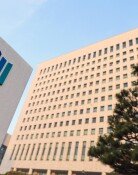Gov`t to resume dialogue with U.S. to revise nuke agreement
Gov`t to resume dialogue with U.S. to revise nuke agreement
Posted April. 08, 2013 08:04,
Seoul and Washington will resume main negotiations to revise the South Korea-U.S. nuclear agreement as early as next week (week of April 15-19). Amid North Korea`s escalating threats day after day, however, the U.S. is increasingly strengthening its stance toward denuclearization," putting an alarm on the South Korean governments negotiation strategy.
As the South Korean government is even considering a strategy of battle with no retreat by preparing itself for the expiration (effective revocation) of the bilateral nuclear agreement signed in 1974, the two close allies will likely hold fierce negotiations over nuclear program to secure national interests of their own.
South Korea plans to dispatch its negotiating team to Washington as U.S. Secretary of State John Kerry concludes his Seoul visit on Friday and Saturday, and start the sixth round of main negotiations over the South Korea-U.S. nuclear agreement. The government is making all-out efforts for negotiations aiming at making some progress at the South Korea-U.S. summit scheduled for May.
Given that a revision bill to the nuclear agreement, which is set to expire in March next year, requires 180 days of grace period to pass the U.S. congress, the two countries should come up with a first draft for their negotiations by this coming August. The two allies have less than five months before holding working-level talks.
South Korea has shown the determination to attain its demand even by considering the worst case scenario, in which the agreement is broken, rather than making an unsatisfactory compromise. But yet Seoul has to overcome negative sentiment that emerged in Washington, which claims that It has become more difficult to accept Seouls demand due to a series of threats from North Korea. According to a source at the South Korean government, Despite our continuous explanations, there is no change to the U.S. stance that it cannot allow South Korea to conduct nuclear-related activities such as uranium enrichment and nuclear fuel reprocessing.
Some experts claim that South Korea should reversely use North Korean threats as leverage in the negotiations." If Seoul seeks to persuade Washington by saying that demand for nuclear fuel enrichment and fuel reprocessing is made in the commercial aspect that has nothing to do with North Koreas nuclear program, it will only end up seeing its stance on shaky ground, said Kim Tae-woo, former head of the state-run Korea Institute of National Unification. Rather than using such cowardly logic, Seoul should vigorously push forward, claiming that the (South) Korean people can hardly accept the situation wherein the South is fully exposed to the Norths nuclear threats. Will the U.S. disregard such a situation its ally is facing?
lightee@donga.com





![반찬통 착색 고민 끝…‘두부용기’ 버리지 말고 이렇게 쓰세요 [알쓸톡]](https://dimg.donga.com/c/138/175/90/1/wps/NEWS/IMAGE/2026/01/09/133126593.3.png)

